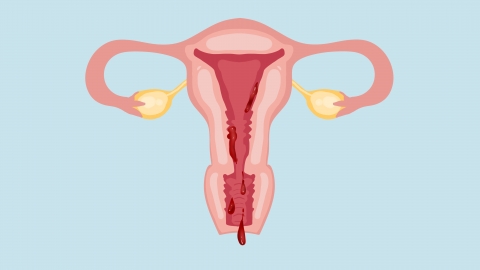What causes abnormal uterine bleeding?
In general, abnormal uterine bleeding may be caused by hormonal fluctuations during puberty, endocrine disorders during the perimenopausal period, endometrial polyps, adenomyosis, uterine fibroids, and other factors. It is recommended to seek timely medical consultation to identify the underlying cause and improve the condition under a doctor's guidance through general treatment, medication, surgical treatment, and other approaches. A detailed analysis is as follows:

1. Hormonal fluctuations during puberty: During puberty, ovarian function is not yet mature, leading to unstable secretion of estrogen and progesterone. The endometrium does not shed regularly, causing heavy menstrual bleeding or prolonged menstruation. Maintain a regular sleep schedule in daily life, avoid staying up late, ensure balanced nutrition, and consume iron-rich foods such as lean meat and spinach.
2. Endocrine disorders during the perimenopausal period: Ovarian function declines during the perimenopausal period, with reduced ovulation and hormonal imbalance. This leads to abnormal endometrial hyperplasia followed by shedding, causing irregular bleeding. Regular gynecological ultrasound examinations are recommended to monitor endometrial thickness. Maintain emotional stability and regulate physical and mental health through mild exercises such as walking or tai chi.
3. Endometrial polyps: Localized excessive endometrial hyperplasia forms polyps. The fragile blood vessels on the surface of the polyps are prone to rupture, causing abnormal bleeding and prolonged menstruation. Patients should follow medical advice to use medications such as dydrogesterone tablets, progesterone capsules, or medroxyprogesterone acetate tablets to regulate the endometrium.
4. Adenomyosis: Endometrial tissue invades the myometrium, causing uterine enlargement and increased vascularity within the muscle layer. This results in significant bleeding during menstruation, manifesting as heavy menstrual bleeding and dysmenorrhea. Patients should follow medical advice to use medications such as triptolide capsules, danazol capsules, or leuprolide acetate microspheres for injection to alleviate symptoms.
5. Uterine fibroids: Uterine fibroids may compress the endometrium or interfere with uterine contractions, leading to vascular rupture and bleeding. Symptoms include increased menstrual flow and prolonged menstruation. If the fibroid diameter exceeds 5 cm, laparoscopic myomectomy may be performed to remove the fibroid, restore normal uterine structure, and improve bleeding symptoms.
During menstruation, maintain good hygiene by frequently changing sanitary pads and avoiding tub baths. Avoid excessive fatigue, maintain a positive mindset, and use comprehensive nursing care to assist in improving abnormal uterine bleeding and maintaining reproductive health.




